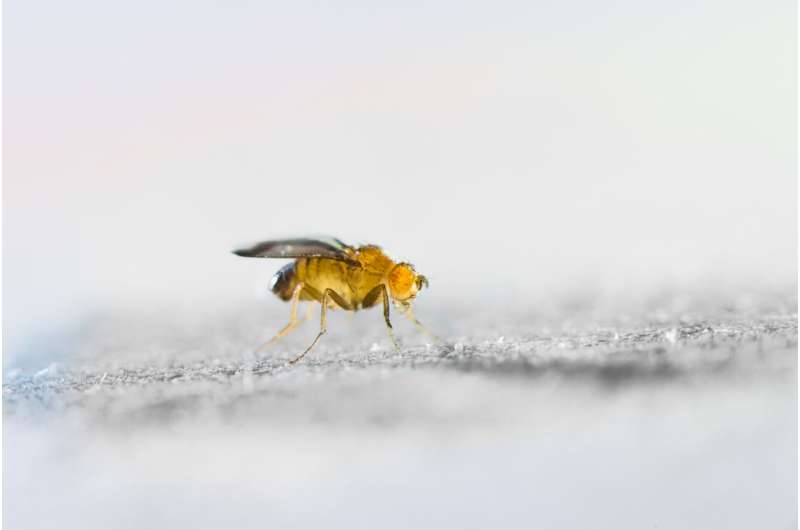New study shows that aging neutralizes sex differences in the brain

When male and female fruit flies age, their brains become desexualized. Age-related changes take place in both sexes, but the male brain becomes feminized to a larger extent than the female brain becomes masculinized. This is the conclusion of a study performed by a research group at Linköping University. The findings are published in the journal Proceedings of the Royal Society B: Biological Sciences.
It is a well-known fact that weaker individuals cannot afford to “invest” in sexual behaviors to the same extent as their healthier conspecifics. However, it is not clear if aging, which weakens individuals, also leads to a reduced investment in sexual activities. You might think that for individuals close to the end of their lives, going “all in” on reproduction, in order to pass on their genes before it is too late, would be best. Sexual behaviors are directed from the brain, and to find out what happens to sex differences in this tissue when fruit flies age, the researchers have investigated how genes expressed to different degrees in young males and females change over time.
“Our results show that gene expression in male and female brains become more similar with age, and that both sexes contribute to this pattern,” says Dr. Antonino Malacrinò, one of the study’s main authors who now works at the University of Reggio Calabria in Italy.
What the study shows is that if the expression of a certain gene is higher in the brains of young females than in young males, the gene’s expressions is reduced in older females and increased in old males—and vice versa for genes with higher expression in young males.
“The results also show that the changes are larger in males than in females,” says Antonino Malacrinò.
The fact that females change less with age than males is presumably the result of that the connection between investment in sexual traits and reproductive success is not as strong in females as in males. While a male fruit fly, in order to reproduce, must out-compete other males in quickly finding females and encouraging them to mate through an intricate and taxing dance performance, a female only needs to decide how much energy she has available for reproduction. Aging implies that reduced amounts of resources are available to invest in reproduction and other activities for both sexes, but stiff competition between males means that the cost of increased investment is greater for them than for females.
“If you keep investing as much as before in reproduction when you get old, you don’t have energy left for survival,” says Urban Friberg, who has led the study and is senior associate professor at the Department of Physics, Chemistry and Biology (IFM) at Linköping University.
Studies on other animals—including humans—that have mainly focused on age-related changes in gene expressions in one sex have given results pointing in the same direction. This indicates that the results shown in fruit flies may also apply to many other animals.
“We get the same general results in both the populations of fruit flies that we have examined, even if they differ quite a bit with respect to which genes are involved,” says Urban Friberg.
The results of the study are reminiscent of those obtained by the group in a previous investigation. In that study, sex differences in gene expression were compared between male and female flies of high and low genetic quality. Similarly to how aging reduces sex differences, the earlier study showed that reduced genetic quality makes gene expression more similar in male and female flies, and again it was males that changed their gene expression more than females.
The study provides no answer to what molecular signal associated with aging lies behind the reduced sex differences in the brain. Further exploration on this topic could be rewarding, especially if the signaling molecule would turn out to be shared with other species.
Choosy female fruit flies reproduce anyway
Ageing desexualizes the Drosophila brain transcriptome, Proceedings of the Royal Society B: Biological Sciences (2022). DOI: 10.1098/rspb.2022.1115. rspb.royalsocietypublishing.or … .1098/rspb.2022.1115
Citation:
New study shows that aging neutralizes sex differences in the brain (2022, August 9)
retrieved 9 August 2022
from https://phys.org/news/2022-08-aging-neutralizes-sex-differences-brain.html
This document is subject to copyright. Apart from any fair dealing for the purpose of private study or research, no
part may be reproduced without the written permission. The content is provided for information purposes only.
For all the latest Science News Click Here
For the latest news and updates, follow us on Google News.

